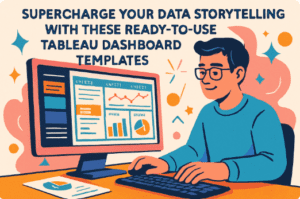Related posts:
- How to Select the Best Tableau Sales Dashboard
- Boost Your Bottom Line with The Ultimate Product Dashboard!
- Our Amazing Tableau GDPR Compliance Guide
- Unlock the Power of Your Data with Our Expert Tableau Data Visualization Consulting Services
- An Interview with an Expert Tableau Consultant For High ROI Tableau Projects
- Learn Tableau: An Amazing Beginner’s Guide to Learning Tableau
Table of Contents
This article discusses Tableau pros and cons. Regarding Business Intelligence (BI) tools, Tableau is a name that frequently comes up in conversations. Known for its powerful data visualization capabilities, Tableau has gained a reputation as a top choice for organizations looking to turn their data into meaningful insights. However, like any tool, there are Tableau pros and cons. In this blog post, we will dive into Tableau’s advantages and disadvantages, exploring Tableau pros and cons and comparing it to its rival, Power BI.
Tableau’s Strengths
Data Visualization Powerhouse
Tableau stands out as an exceptional data visualization tool. It excels in helping users create visually appealing and insightful dashboards that turn raw data into compelling stories.
Intuitive Drag-and-Drop Interface
Tableau’s user-friendly drag-and-drop interface makes it accessible to many users without extensive technical skills. Creating interactive visualizations is a breeze, empowering users to explore and present data effortlessly.
Handling Large Datasets with Ease
Handling large datasets can be a nightmare for some BI tools, but not for Tableau. It efficiently manages substantial volumes of data, ensuring that performance remains top-notch even when dealing with massive datasets.
Integration with Python and R
For users looking to perform advanced data processing, Tableau offers integration with Python and R. This capability opens up a world of possibilities for data analysis, machine learning, and statistical modelling within the Tableau environment.
Mobile-Friendly and Responsive Design
In an era where mobile devices play a crucial role, Tableau doesn’t disappoint. It provides excellent support for mobile devices, allowing users to access and interact with their dashboards. Its responsive design ensures that dashboards adapt to different screen sizes seamlessly.
Leadership in the BI Industry
Tableau has earned its stripes as a leader in the BI industry. Its track record for innovation and its commitment to delivering cutting-edge BI solutions have solidified its position at the forefront of the field.
Tableau’s Weaknesses
Lack of Automatic Report Refreshing
Tableau falls short in the automation department regarding report refreshing. Users must manually refresh reports, which can be time-consuming in organizations with frequent data updates.
Complex Custom Visual Imports
Unlike some competitors, Tableau doesn’t make importing custom visuals a straightforward process. Users may find it challenging to incorporate custom visualizations into their Tableau projects.
Tedious Custom Formatting
Custom formatting in Tableau can be a tedious and time-consuming process. Applying the same formatting to multiple fields often requires manual adjustments, which can be frustrating for users seeking efficiency.
Resolution and Responsiveness Issues
Tableau dashboards may face challenges in adapting to varying screen resolutions. This lack of responsiveness means developers may need to create separate dashboards for different devices.
Limited Data Preprocessing
While Tableau excels in data visualization, its data preprocessing capabilities are somewhat limited. Users who need to perform extensive data cleansing or transformations may find Tableau lacking.
Scalability and Pricing
Scalability can become an issue for large organizations. The cost associated with Tableau’s enterprise-level solutions, such as Tableau Server and Tableau Online, can be prohibitive for some businesses.
Comparisons with Power BI
User-Friendliness vs. Complexity
Power BI is often considered more user-friendly, particularly for non-technical users. However, the learning curve for DAX (Data Analysis Expressions) in Power BI can be steep, making it challenging for Excel users transitioning to a BI tool.
Integration and Ecosystem
Power BI’s seamless integration with the Microsoft stack, including Microsoft 365 and Teams, is a significant advantage for organizations already invested in Microsoft products. Tableau, on the other hand, may not offer such a tight integration.
Visual Flexibility vs. Familiarity
Tableau provides more visual flexibility, allowing users to create intricate and customized visualizations. On the contrary, Power BI strives to adopt a more Excel-like interface, prioritizing familiarity over extensive customization.
Cost Considerations
The cost factor plays a significant role in the Tableau vs. Power BI debate. Tableau can be costlier, especially for organizations with a large user base. Power BI offers more affordable options and maybe a better fit for budget-conscious organizations.
Personal Preferences
Personal preferences often come into play when choosing between Tableau and Power BI. Some users prefer Tableau for its robust relationship model and visualization capabilities, while others may find Power BI’s DAX language challenging but appreciate its integration with the Microsoft ecosystem.
In Conclusion – Tableau Pros and Cons
There are many Tableau pros and cons. Tableau is undeniably a powerful data visualization tool that excels in helping users transform data into compelling visual narratives. Its strengths are its intuitive interface, large dataset handling, and advanced data processing support. However, it’s not without drawbacks, including automation, custom formatting, and scalability challenges.
When comparing Tableau to its rival, Power BI, factors such as user-friendliness, integration, cost, and personal preferences come into play. Power BI may be the preferred choice for organizations deeply embedded in the Microsoft ecosystem, while Tableau offers unmatched visual flexibility.
Ultimately, the decision between Tableau and Power BI should be based on your organisation’s specific needs and goals. There are many Tableau pros and cons, and understanding the advantages and disadvantages of Tableau is a crucial step in making an informed choice that aligns with your BI strategy.







